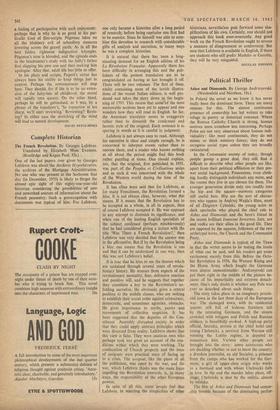Complete Historian
The French Revolution. By Georges Lefebvre. Translated by Elizabeth Moss Evanson. (Routledge and Kegan Paul, 35s.) ONE of the last papers ever given by Georges Lefebvre was about the Archives Hypothecaires, the archives of the Mortgage Administration. No one who was present at the Sorbonne that day (in December, 1955) is likely to forget the almost epic sight of this eighty-one-year-old historian considering the possibilities of new and unworked sources of information about the French peasantry. Such a preoccupation with documents was typical of him. For Lefebvre, one only became a historian after a long period of research; before being capitaine one first had to be matelot. Since he himself was able to com- bine this devotion to research with considerable gifts of analysis and narration, in 'many ways he was a complete historian.
It is natural that there has been a long- standing demand for an English edition of his La Revolution Francaise. Apparently there has been difficulty in arranging this and the pub- lishers of the present translation are to be congratulated on having at last brought it off. There will be two volumes. The first of these, whilst containing none of the lavish illustra- tions of the recent Italian edition, is well pro- duced and takes the story down to the begin- ning of 1793. This means that some 'of the most memorable sections have yet to appear and one wonders how they will read in English. So far, the American translator seems to exaggerate rather than to diminish the condensed and laconic style of the original. Each sentence is as sparing in words as it is careful in judgment.
Lefebvre is not always easy to read. Although his narrative is clear and simple enough, he is concerned to interpret events rather than to narrate them, and a reader who knows nothing at all about the period might find this book rather puzzling at times. One should explain, too, that the original, first published in 1951, was part of the Pcuples et Civilisations series and as such it was concerned with the whole of the Western world during the time of the Revolution.
It has often been said that for Lefebvre, as for many Frenchmen, the Revolution formed a bloc. It is not always clear, however, what this means. If it means that the Revolution has to be accepted as a whole, in all its aspects, then of course Lefebvre accepted it. He was opposed to any attempt to diminish its significance, and when one of the leading English specialists of the subject confessed (perhaps mischievously) that he had considered giving a lecture with the title Was There a French Revolution?,' then Lefebvre was very decided that the answer was in the affirmative. But if by the Revolution being a bloc one means that the Revolution is one and that it can be understood in one way, then this was not Lefebvre's belief.
It is true that he tries to see the themes which are sustained through several years of revolu- tionary history. He stresses three aspects of the revolutionary mentality, fear, defensive reaction and punitive will, and he suggests that together they constitute a key to the Revolution's un- folding narrative. He obviously gives a central position to the middle classes, who are seeking to establish their social order against aristocratic, democratic, and sometimes agrarian, obstacles. He gives importance to myths, panics and movements of collective suspicion. It has been suggested that the deputies of the Con- stituent Assembly disrupted society in order that they could apply abstract principles which were divorced from reality. Lefebvre shows that this view is false. They were cautious men who perhaps took too great an account of the con- ditions within which they were working. The confiscation of Church property and the issue of assignats were practical ways of facing up to a crisis. The assignat, like the plans of all the politicians, was upset by the war, and the war, which Lefebvre thinks was the main force impelling the Revolution onwards, is, in many ways, the responsibility of the other European powers.
In spite of all this, some people feel that Lefebvre, in rejecting the simplicities of other
historians, nevertheless puts forward some sim- plifications of his own. Certainly, one should not approach this book over-reverently. Any good work on the French Revolution ought to arouse a measure of disagreement or controversy. But now that Lefebvre is available in English, if there are students who still prefer Madelin or Gaxotte, they will be very misguided.
DOUGLAS JOHNSON


































 Previous page
Previous page